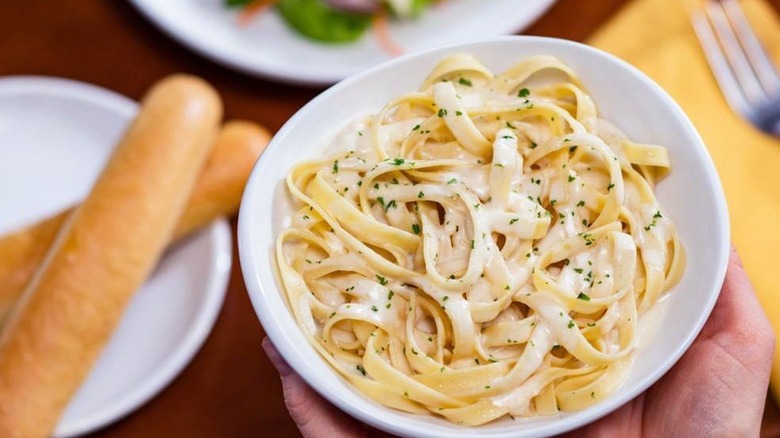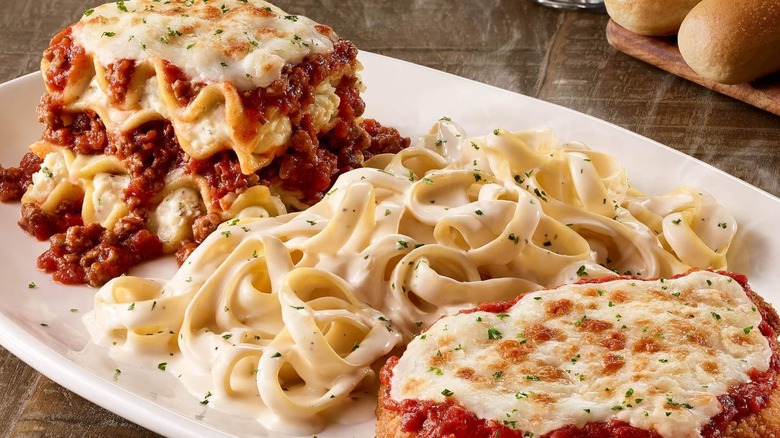Why You Won't Find Al Dente Pasta At Olive Garden
Olive Garden bills itself as somewhere people can get fresh Italian cuisine in the United States. However, while Olive Garden does serve classic Italian dishes like lasagna, alfredo, and ravioli, the chain doesn't necessarily follow all of Italy's traditional cooking methods. One such example is Olive Garden not serving its pasta "al dente," even if you were to request it that way.
If you don't understand this term, "al dente" is defined as cooking pasta to a slightly underdone texture. This means it is cooked just enough so the pasta is not undercooked and hard to chew but still has a bit of bite or toughness. When you bite down, the pasta keeps its shape instead of immediately turning into overcooked mush. Although there's nothing wrong with serving pasta that isn't al dente, it may seem strange that Olive Garden — a place that serves traditional Italian foods — wouldn't follow this extra step in its kitchens.
The reason Olive Garden doesn't serve pasta al dente isn't because it has a grudge against Italian culture or the customer. The customers, and their American palates, are why Olive Garden refuses to cook pasta any other way.
Americans just don't like al dente pasta
Italians and Americans may enjoy many of the same foods — in this case, pasta — but both cultures enjoy them differently. Italians may prefer their pasta cooked al dente, but Americans aren't as strict about how pasta is cooked and shy away from al dente more often than not.
In a 2010 interview with ABC News, then-president of Olive Garden, Dave Pickens, explained that the chain chose to respond to what its customers like to eat. Since Americans don't want their pasta to be cooked al dente, Olive Garden won't cook its pasta that way. Instead, Olive Garden cooks its pasta a little longer, boiling it for about one minute more than required to ensure it is soft and tender rather than deliberately undercooking it.
Interestingly, this isn't the first time the restaurant chain has deviated from traditional Italian cuisine to cater to its customers. Olive Garden also uses more cheese than Italians would to satisfy the appetites of American customers. It may serve Italian food, but it's an American company first and foremost.
Cooking pasta one way is better for the kitchen
Let's imagine that Olive Garden announced it would start cooking customers' pasta al dente upon request. Let's also imagine that, during a busy dinner rush, half of the diners ordered pasta cooked al dente, and the other half ordered it cooked the usual way. It shouldn't come as any surprise to think the kitchen would be even more hectic since the staff would be trying to cook pasta to order in two different ways.
Even if Olive Garden's American customer base preferred al dente, unless the company committed to retraining cooks, it would most likely cook its pasta the same way it always has. Cooking the pasta one way keeps the whole process uniform, meaning employees don't have to spend time trying to cook every order to the customer's specifications. It's easier to cook everything one way and keep everything running smoothly.
While the texture of pasta might not matter as much to customers, other practices have been called into question. You might be surprised to learn this isn't the only "sacred rule" of cooking pasta that Olive Garden breaks. Interestingly, the restaurant doesn't salt its pasta water, despite demands that it begin doing so.


